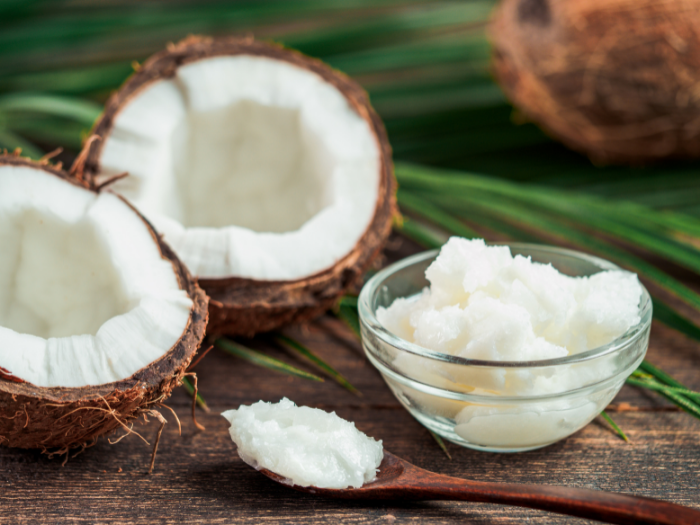Due to coconut oil being largely made up of MCTs, and coconut oil carrying so many health benefits, people are realizing the advantages to taking MCTs.
But what are MCTs and what are their benefits?
In today’s article, I’m going to explain MCTs and 7 amazing health benefits that they can offer.

MCTs stands for medium-chain triglycerides. They’re a type of fat found in foods like coconut oil and are metabolized differently than long-chain triglycerides (LCTs), a type of fat that is found in most other foods.
Triglyceride is the technical term for fat, named after its chemical structure – a glycerol molecule and three fatty acids.
When consumed, triglycerides are either burned for energy or stored as fat. Because they are medium-chain – meaning they have fewer carbon fatty acids than LCTs – MCTs are rapidly broken down and less likely to be stored as fat.
Because it’s digested quickly, MCTs can offer a boost of energy, both mentally and physically. But let’s get into the specific benefits offered by taking MCTs.
Many people have been finding luck managing their weight with MCTs. This may be why MCT oil is so popular amongst bodybuilders and athletes.
One reason MCT may be able to help with weight loss is because it releases two hormones that can promote the feeling of fullness – peptide YY and leptin. [1]
One study explored this by having participants have either coconut oil or MCT oil as part of their breakfast. Those who included MCT oil with their breakfast ended up eating less at lunch. The study also found a lower rise in triglycerides and glucose, which can also promote satiety. [2]
Other studies have found that MCT oil can help prevent obesity by reducing body weight and waist circumference. [3, 4, 5]
MCTs contain about 10% less calories than LCT’s, which are found in foods like olive oil, nuts, or avocados. This may also contribute to their weight management capabilities. [6, 7]
Also, if you’re following a ketogenic diet – consuming low carbs and high fat – MCTs may help you stay in ketosis since MCTs can be converted into ketones. [8, 9]
Finally, MCT’s can help promote healthy bacteria in the gut. This can promote weight loss as the presence of unhealthy bacteria in the gut has been attributed to weight gain and obesity. [10, 11]
As opposed to LCTs, MCTs don’t require bile to be broken down and can travel quickly from the gut to the liver. This is thanks to their shorter chain length. [12]
Once in the liver, fats are either used as energy or stored as fat. Because MCTs can easily enter cells without being broken down, they can immediately be used as a source of energy. [13]
And if you’re following a ketogenic diet, MCTs can be turned into ketones and pass through the blood-brain barrier where they’ll be used by your brain cells for energy.

When working out, high lactate levels may negatively impact your performance.
Lactate is a substance produced by the body during exercise when it doesn’t have enough oxygen to create glucose. It then uses lactate as a source of energy. This is a problem because lactate can build up and increase the acidity of the muscles.
As it turns out, MCTs can help reduce the levels of lactate during exercise.
One study found that cyclists who took MCT oil before their workout had less lactate buildup and found it easier to exercise. [14]
The same study also found that MCTs may encourage your body to burn fat for energy instead of carbs, increasing fat burning.
A study done in mice also found that MCTs improved their endurance when swimming. [15]
Diseases related to declining cognition inhibit the brain’s ability to use sugar. [16]
But, especially if on a ketogenic diet, MCTs can offer an alternative energy source for brain cells. Not only that, but ketones can block a receptor in the brain which causes memory loss. [17]
One study found that just one dose of MCTs improved short-term cognition in 20 people with Alzheimer’s disease. [18]
Other research has found MCTs to be a promising contender for treating cognitive decline. [19]
MCTs have demonstrated powerful antibacterial and antifungal capabilities. [20, 21, 22]
One study found that coconut oil – which is high in MCTs – reduced the growth of Candida albicans by 25%. This is a yeast that can cause several different types of skin infections. [23]
In another study, coconut oil also reduced the growth of Clostridium difficile, also a disease-causing bacteria. [21]
And MCTs themselves have been shown to lower the growth of an infectious fungus in hospitals by 50%. [22]
MCTs have been shown to reduce the risk of heart issues by lowering factors related to poor heart health.
One study involving overweight men found that supplementing MCTs lowered overall cholesterol by 12.5%. [23]
Another study also found that coconut oil increased levels of HDL cholesterol, the good type of cholesterol, which helps protect the heart. [24]
Other research has found that MCTs can reduce several other heart disease risk factors, such as inflammatory markers that can impact the heart. [25, 26, 27]
MCTs may be able to help those struggling with blood sugar issues by reducing fat storage and increasing fat burning. [28]
One study compared daily intake of MCTs with LCTs. They found that those taking MCTs every day saw reductions in body weight, waist circumference, and insulin resistance. [29]
Another study found that taking in MCTs helped diabetics better manage their blood sugar levels. [30]
Coconut oil and palm oil are the best food sources of MCTs. Milk and yogurt contain some amounts of MCTs as well.
If you’re looking for a regular and reliable intake of MCTs in order to experience the benefits listed above, I have good news for you.
Complete Collagen+ contains MCTs!
Sourced from coconuts, the MCTs in our highly bioavailable Complete Collagen+ can help support a healthy lifestyle.
To see what other amazing ingredients are in Complete Collagen+ (and how they can help you) CLICK HERE!